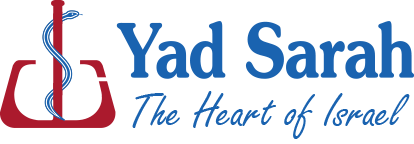‘It’s The Most Important Thing I Can Do Now,’ says Eliyahu Martziano of his volunteerism
Yad Sarah volunteer driver Eliyahu (Eli) Marziano single-handedly evacuated dozens of individuals from the southern Israeli communities near the Gaza border in the initial days of war.
During those dark days, Eli transversed roads with incessant rocket fire overhead in his wheelchair-accessible van to reach elderly people, those with disabilities, and their families, who all desperately needed a way out of the ongoing danger. Despite the potential risk to himself, he remained a dedicated part of Yad Sarah’s nechonit unit, just as he has for years.
“In such a situation, you don’t think about the danger, but about accomplishing the mission,” he says.
Eli, who was born in Morocco and made aliyah in 1967, first encountered Yad Sarah more than 15 years ago, when his sister who lives in France suggested he use the nechonit service to ensure that his wheelchair-bound mother could attend his daughter’s wedding.
“I wasn’t sure she would be able to attend, but Yad Sarah sent a driver so she could be there,” he recalls.
Two days after the wedding, Eli walked into the Yad Sarah branch in Ashkelon and volunteered to become a nechonit driver. A few days of training later and he was on the road. Each day after finishing his workday as a high school principal and physics teacher, he would drive people with disabilities all over the country for appointments, events, outings and family visits.
“Since the war started, the driving has become an even bigger part of my life, it’s the most important thing I can do now,” he says.
On Oct. 8, the day after the Hamas attack began, Eli, who lives in Yad Binyamin, became the main responder for urgent calls in the South, responding to requests 24 hours a day, 7 days a week, often driving frightened passengers under rocket fire.
Even months into the war, rocket attacks continued on a nearly daily basis across many parts of Israel. The protocol for a nechonit during rocket sirens is to stop the van somewhere safe and for all mobile people to get out of the car and lie down on the street. Unfortunately, those who use wheelchairs must stay in the vehicle since it is impossible to get them out in such a short amount of time.
He recalls one incident during the war when a siren sounded as he was transporting a particularly anxious teenage girl in a reclining wheelchair along with her mother from their home in Ashdod to a medical appointment. They stopped the van on the side of the road, but rather than getting out and lying down on the street for more protection, Eli stayed inside the van alongside the frightened girl and her mother.
“I couldn’t get out and leave them,” he says.
The mother hugged the girl while Eli prayed silently for their safety. The siren passed, and they continued on their journey.
On another drive, he evacuated a woman who had recently given birth along with her family. Eli’s Yad Sarah-issued van provided her with a semblance of physical comfort amid the distressing experience of rushing out of their home with a newborn. It also allowed for more space than a private car to quickly stash their belongings and baby supplies.
While providing accessible transportation to save and enhance the lives of humans is his main focus, Eli’s services have also been instrumental in protecting the livelihood of war victims whose workplaces were unattainable due to their location in active combat zones.
In one instance, he loaded his van full of plants to help the evacuated community from hard-hit Netiv Haasara relocate their flower nursery. He took them from the Gaza border to a greenhouse near his town, where they were tended to and sold, the profits returning to the owners.
Constantly adapting to where his driving is needed most, Eli has recently attended to the uptick in demand for transportation of people and equipment between hospitals around the Center of the country. This is part of Yad Sarah’s critical role in filling the gaps in the healthcare system to free up hospital beds and support the home rehabilitation for the unprecedented, and growing, number of wounded soldiers and civilians.
Eli says he treasures his ability to help people, and the friends he has made along the way, especially with fellow volunteer drivers.
“I have really seen that when it comes to volunteering with Yad Sarah that you truly receive more than you give,” he says.


